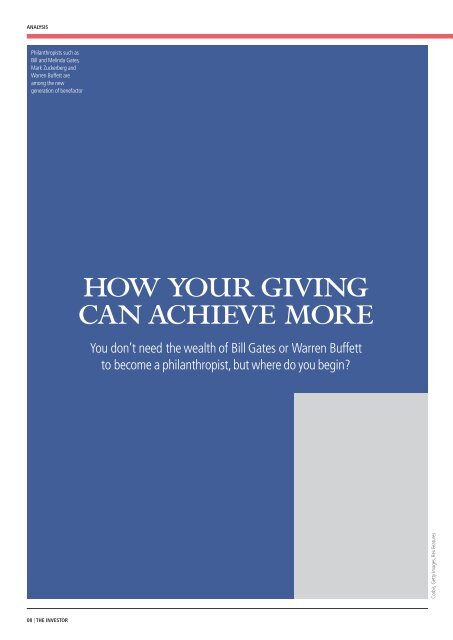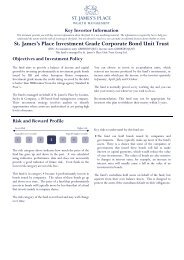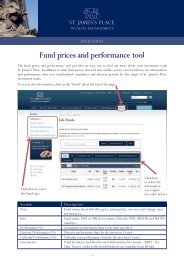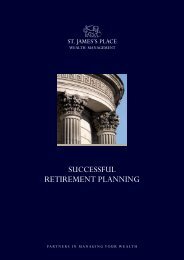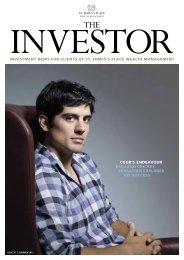Summer Investor Magazine - St James's Place
Summer Investor Magazine - St James's Place
Summer Investor Magazine - St James's Place
You also want an ePaper? Increase the reach of your titles
YUMPU automatically turns print PDFs into web optimized ePapers that Google loves.
analysisANALYSISPhilanthropists such asBill and Melinda Gates,Mark Zuckerberg andWarren Buffett areamong the newgeneration of benefactorSPECIAL REPORTThe benefactor can specifyhow he or she wants themoney to be usedAlexandra Loydonhow your givingcan achieve moreYou don’t need the wealth of Bill Gates or Warren Buffettto become a philanthropist, but where do you begin?Corbis,Corbis,GettyGettyImages,Images,RexRexFeaturesFeaturesThe wealthy have a longtradition of philanthropywith today’s generousbenefactors, like Bill andMelinda Gates and LordSainsbury, continuing the traditionestablished by industrialists like JosephRowntree and Andrew Carnegie.Their generosity is on a magnificent scale:the Carnegie Corporation and the JosephRowntree Trust are still funding the samekind of projects more than a century afterthey were originally established, while thesize of the legacies by the Gateses and LordSainsbury – $28 billion so far for the formerand more than £1 billion from the latter– means they are also likely to endure. Buta growing number of those of relativelymore modest means are also keen to leave anenduring legacy through philanthropy, andthey want to be sure that their donations areused to create maximum benefit.The statistics bear out the increasedgenerosity among the moderately wealthy.The Charities Aid Foundation’s (CAF)World Giving Index found that, althoughgeneral consumer giving has fallen globallyduring the economic crisis, from 29.8% oftotal donations in 2007 to 28% in 2011, italso shows that giving by high net worthindividuals has increased.The survey also found that like-for-likegiving among the top 100 philanthropistsin 2012, as measured by the proportionof their total wealth given away in the pastyear, showed a £305 million increase on theprevious year, rising from £1,467 million to£1,772 million.Amy Clarke, head of advisory at CAF,says: ‘In the toughest times you see some ofthe brightest philanthropists step up and dosome incredible things.’Serious philanthropy needs carefulplanning. Recent research by the fiduciarymanagement services company, SEI, foundthat the wealthy are intrinsically generous,driven mostly by the need to give purposeto their wealth. However, many of the200 questioned for the survey would bewilling to give even more – almost twice asmuch – if they were able to move beyondan impulsive approach to a well-consideredgiving strategy.Benefactors who have made their moneyby being professional and organised in theirapproach to their business activities want toexert the same discipline on their charitabledonations so, if they are giving away largeamounts of money, they want to be sure thatit is being used wisely.Alexandra Loydon, head of private clientservice for <strong>St</strong>. James’s <strong>Place</strong>, says manybenefactors prefer to establish a trust orfoundation rather than make direct donationsas this enables them to retain better controlover how the money is distributed and used.‘This has benefits for both philanthropistsand charities. The benefactor can specifyexactly how he or she wants the money to beused, and to invest the money so it can growand provide further funds for distributionto good causes,’ she says. ‘It also enablesmoney to be given to smaller charities orprogrammes which might benefit more fromsmall but regular donations rather than alarge one-off payment.’CAF will help new philanthropists get abetter understanding of what they want toachieve and how to maximise the value ofwhat they do. This starts with identifyingthe individual’s background, includingany health issues, their heritage, familybackground and career.CAF itself does not favour one charityabove another but once a benefactor hasidentified the causes he or she wants tosupport, it will draw up a shortlist ofpotential beneficiaries and do due diligenceto make sure they are delivering on theirpromises. It can also advise benefactors onthe level of impact that charities are achievingwith the money raised, although this is notdone as a standard part of the service.While many of the biggest benefactorshave trusts and foundations bearing theirname, not everyone likes their donations toTHE ST. JAMES’SPLACEFOUNDATION<strong>St</strong>. James’s <strong>Place</strong> has established its ownfoundation with the aim of making asignificant difference in three areas: to thelives of children and young people,combatting cancer, and supporting hospices.The vast majority of funds contributed tothe Foundation come through fundraising ordonations made by the Partners andemployees of <strong>St</strong>. James’s <strong>Place</strong>. These fundsare matched pound for pound by thecompany, and in the past 20 years the<strong>St</strong>. James’s <strong>Place</strong> community has raised anddistributed more than £30 million to goodcauses. To find out more about the<strong>St</strong>. James’s <strong>Place</strong> Foundation visitwww.sjpfoundation.co.ukbe that high profile: one of the key decisionswill be whether to retain anonymity orwhether to use their own generosity toencourage the same behaviour in others.‘We never discuss our private clientsby name, and their trust or foundation canremain anonymous or have a name thatwould not identify them,’ says Clarke. ‘Butmany people like to have their trust namedafter a specific person, or for their foundationto take the family name. If someone hasa brand name, it can be used to galvanisesupport for the causes that they are helping.’The advisory process also enablesbenefactors to work out what kind ofinvolvement they would like. ‘This shouldhelp develop a strong emotional andintellectual connection. This can takeanything from a couple of hours to months,’says Clarke. ‘We have one high net worthindividual who, one year on, is still workingon this. The value of the assets undermanagement is very significant and he reallywants to take care that he gets this right.’Balance sheet Although consumer giving has fallenduring the economic crisis, philanthropic activitiesfrom high net worth individuals are on the rise. A newservice from <strong>St</strong>. James’s <strong>Place</strong> looks to help thosewishing to set up a charitable trust or foundation.08 | THE inVEsTORTHE INVESTOR | 09


